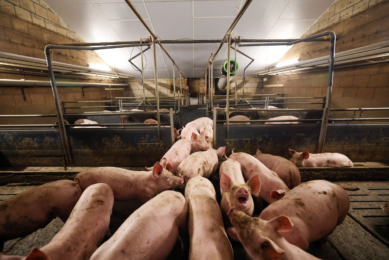Time to re-instate food waste into livestock diets?
According to waste food expert Tristram Stuart, the introduction of a formalised system of sterilising and processing waste food and converting it into a useable livestock feed is inevitable.
Stuart, a lecturer at Sussex University and author of Waste: Uncovering the Global Food Scandal, said he believed a nationwide off-farm food-recycling programme will provide vast tonnages of low-cost feed for UK pig producers.
He added that because of the ever-increasing concern for environmental and economic.
approaches to food production, the demand will be driven by consumers.
"There will soon be zero tolerance among consumers over the 20m tonnes of waste food that has to be disposed of every year in the UK," Stuart said.
Stuart also defended the reputation of human food waste when it is accused of posing serious health risks – not to mention being the trigger for the 2001 foot-and-mouth epidemic.
"There’s never been any scientific evidence that has proved or linked the feeding of processed waste food to pigs with foot-and-mouth or swine fever," said Mr Stuart. "And it’s wrong to believe there’s a total refusal among pig producers to accept that waste food has to have a future role in the UK pig industry.
"It does, and more pig farmers agree with that," said Mr Stuart.
He identified waste food as falling into two categories – that which is only deemed to be waste by the nature of its sell-by date and that which has been cooked or processed in some way but has not been consumed.
"There are massive tonnages of food coming out of supermarkets that are only classed as waste because they are outside their sell-by date.
"A lot of this is meat-free and includes bread and cereal-based foods as well as dairy products, vegetables and fruit. Much of this waste food is still fit for human consumption but it isn’t coming back into the food chain – so we must look at turning it into livestock feed," he said.
"Even if there are those who have issues over processing meat-based waste food for livestock, why aren’t we making more use of the non-meat-based waste? That at least would be a start," Stuart said.
He is convinced the strong swing of public opinion in favour of the economic and environmental advantages of utilising waste food will bring about the necessary changes to EU law.
"There has been an overwhelming change in public opinion on the issue of waste food and it’s this complete change of mindset that will drive forward the ethical arguments – not only to make use of the food but also for the impact it will have on the environment.
"The EU imports 40m tonnes of soya a year. Producing that soya comes at a huge environmental cost. If we made more use of waste food for animal feed we could substantially reduce pig farmers’ costs of production as well as having a significant environmental impact."
According to Stuart centralised and officially regulated processing plants should be set up to heat-treat and process waste food into animal feed.
"The government isn’t there yet, but public pressure is mounting and something will have to be done. Livestock farmers must get behind this."
He gave one example of the ignorance that pervaded the food sector in relation to waste food.
"A company making sandwiches for a major retailer was told that it must discard the first four slices of every loaf because the shape of the slices wasn’t uniform.
"That represented a 17% wastage of bread and was costing the company £60-£80 a tonne for disposal. Since addressing this situation the company is now selling the 17% of waste bread and earning an extra £100,000 as a result."











